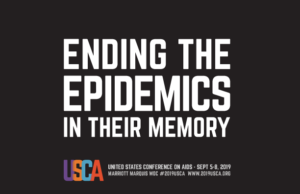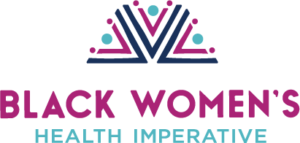 This year the United States Conference on AIDS received 1,112 scholarship requests and awarded 216 scholarships. Unfortunately, the vast majority of people were turned down. People are upset, and I am sorry. When you look at the demographics of who got scholarships, USCA prioritized People Living with HIV and People of Color, the communities hardest hit by HIV. Fifty scholarships were set aside for people Over 50 Living with HIV, 30 for youth, 15 for People on PrEP, 18 for Social Media Fellows and the balance in the general pool. The process was set up through Events Rebels. Our reviewers go online and blindly review the applications without seeing the applicants’ names. Reviewers were people who work on the frontlines of the epidemic and are part of the Constituent Advisory Panels (CAPs).
This year the United States Conference on AIDS received 1,112 scholarship requests and awarded 216 scholarships. Unfortunately, the vast majority of people were turned down. People are upset, and I am sorry. When you look at the demographics of who got scholarships, USCA prioritized People Living with HIV and People of Color, the communities hardest hit by HIV. Fifty scholarships were set aside for people Over 50 Living with HIV, 30 for youth, 15 for People on PrEP, 18 for Social Media Fellows and the balance in the general pool. The process was set up through Events Rebels. Our reviewers go online and blindly review the applications without seeing the applicants’ names. Reviewers were people who work on the frontlines of the epidemic and are part of the Constituent Advisory Panels (CAPs).
Here are the demographics for the awardees:
HIV Status
- Positive – 57%
- Negative – 34%
- On PrEP – 5%
- Undeclared/Unknown/No Answer – 6%
- AA/Black – 54%
- Latinx – 21%
- Caucasian/White – 14%
- Asian – 4%
- AIAN and NHPI – 5%
- Not Disclosed/No Answer – 2%
- Male – 53%
- Female -33%
- MTF or Trans Woman – 8%
- FTM or Trans Man – 1%
- Gender Queer/Androgynous – 2%
- No Answer – 2%
- Indian Health Service
- Latino Commission on AIDS
- National Black Gay Men’s Advocacy Coalition
- Positive Women’s Network-USA
- Transgender Law Center
 In addition to these partners, the Black Women’s Health Imperative is bringing 200 African American women to USCA. We are very thankful to our colleagues for their support. NMAC believes it is important to have diverse organizations selecting scholarship recipients from their constituents. The goal is for USCA to reflect the demographics of the epidemic.
In addition to these partners, the Black Women’s Health Imperative is bringing 200 African American women to USCA. We are very thankful to our colleagues for their support. NMAC believes it is important to have diverse organizations selecting scholarship recipients from their constituents. The goal is for USCA to reflect the demographics of the epidemic.
 NMAC also heard concerns about the same people getting scholarships. We did a look back and saw around 30% of the scholarships went to people who received one previously. That means 70% went to new leaders. Most of the repeats happened for the Youth Scholars. This is strategic because the agency believes it takes more than one year to build leaders. The agency also gives a limited number of repeat scholarships in our Over 50 Living with HIV initiative. We try to bring previous recipients back to help run the program onsite and to act as mentors. Some people do get scholarships every year, but they aren’t necessarily from NMAC. Thankfully, we have partners and donors who provide scholarships independent of NMAC. Many attendees are sponsored by community-based organizations and/or the health department.
NMAC also heard concerns about the same people getting scholarships. We did a look back and saw around 30% of the scholarships went to people who received one previously. That means 70% went to new leaders. Most of the repeats happened for the Youth Scholars. This is strategic because the agency believes it takes more than one year to build leaders. The agency also gives a limited number of repeat scholarships in our Over 50 Living with HIV initiative. We try to bring previous recipients back to help run the program onsite and to act as mentors. Some people do get scholarships every year, but they aren’t necessarily from NMAC. Thankfully, we have partners and donors who provide scholarships independent of NMAC. Many attendees are sponsored by community-based organizations and/or the health department.
I know people were disappointed. I was disappointed that we could not fund more scholarships. In our efforts to support new leaders, sometimes scholarships are given to newer activists. Getting a scholarship is not a reflection of your value as an activist. Many long-term leaders in our movement did not get a scholarship. Given the concerns, NMAC will:
- Do a complete review of the scholarship process,
- Host an online evaluation to gather more community input,
- Open Constituent Advisory Panels to new members and new scholarship reviewers
Yours in the struggle,
Paul Kawata
30 Years of Service